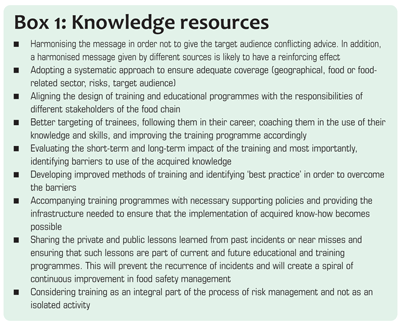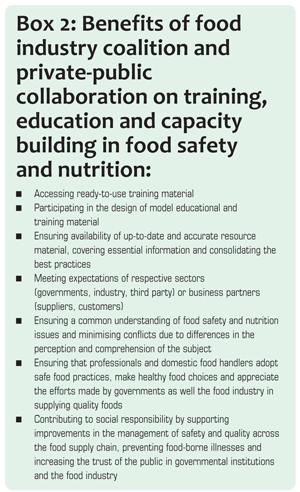Training, education and capacity building in food and water safety and in nutrition
- Like
- Digg
- Del
- Tumblr
- VKontakte
- Buffer
- Love This
- Odnoklassniki
- Meneame
- Blogger
- Amazon
- Yahoo Mail
- Gmail
- AOL
- Newsvine
- HackerNews
- Evernote
- MySpace
- Mail.ru
- Viadeo
- Line
- Comments
- Yummly
- SMS
- Viber
- Telegram
- Subscribe
- Skype
- Facebook Messenger
- Kakao
- LiveJournal
- Yammer
- Edgar
- Fintel
- Mix
- Instapaper
- Copy Link
Posted: 20 February 2009 | Leon Gorris, Senior Scientist Risk Assessment, Unilever and Yasmine Motarjemi, Corporate Food Safety Manager, Nestlé | No comments yet
This paper argues the case for increased awareness of the importance of training and competence in management of food and water safety, prevention of food-borne and waterborne illnesses and improvement of health and nutritional status. The challenge is huge as almost everyone needs to receive education commensurate with his or her role in the food chain and the assurance of water safety.
This paper argues the case for increased awareness of the importance of training and competence in management of food and water safety, prevention of food-borne and waterborne illnesses and improvement of health and nutritional status. The challenge is huge as almost everyone needs to receive education commensurate with his or her role in the food chain and the assurance of water safety.
This paper argues the case for increased awareness of the importance of training and competence in management of food and water safety, prevention of food-borne and waterborne illnesses and improvement of health and nutritional status. The challenge is huge as almost everyone needs to receive education commensurate with his or her role in the food chain and the assurance of water safety.
While laudable efforts are made to train and educate professionals as well as consumers in food and water safety and nutrition, these capacity building efforts will benefit from a better coordination and strategic planning at the global level and from a broader support of governmental initiatives by the food industrial and allied sectors, coupled to a more effective implementation at the local level. This paper presents the vision of Industry Council for Development on the subject and proposes a strategy for improving the infrastructure for training, education and capacity building in food, water and nutrition The strategy is based on effective leveraging of resources through public-private sector partnership.
The global need for training, education and capacity building
The most precious asset in a food business is consumers’ trust. It is the basis of every company’s existence and in order to secure that trust, it is key that food safety can be ensured at the global level.
In today’s world, the issues associated with food and water safety as well as with sound nutrition have become multifaceted and highly complex. During the past two decades, public and private stakeholders have worked together, built infrastructures for sharing knowledge on a global scale and taken a wide range of measures that have resulted in notable improvements. Nevertheless, there are still too many cases, outbreaks, epidemics of food-borne illness or just malpractices leading to food contamination and ultimately to illnesses or loss of food. Likewise, nutrition problems, be it under nutrition due to food security problems or obesity, are a rising concern and the public health community urges sound and urgent measures. This serious situation affects countries in all parts of the world, developing and industrialised countries alike.
For decades, food communities have been working locally, regionally and globally with governmental agencies and together have established the technical skills, scientific knowledge and managerial experience necessary to ensure consumer safety and to provide good advice on nutrition, but these matters are not always communicated effectively to those food professionals and consumers that need to know in everyday practice. For the world to improve food and water safety as well as the nutrition status of consumers everywhere possible and in a sustainable manner, the good knowledge accumulated over many years should not be on paper alone, but also imprinted in the minds and hearts of all stakeholders and aggressively disseminated broadly.
Focusing on food safety for the moment, it is clear that food can be subject to contamination at any stage of the food chain from primary production to food manufacturing, transport and preparation of food for consumption. Therefore, even to the present day, all stages of the food chain remain vulnerable to the impact of food safety incidents, though with varying degrees of risk. Then the question is why, in spite of our scientific and technical know-how, reinforcement of legislation and advancement of the food safety assurance system such as the introduction of hazard analysis and critical control point (HACCP) system, we cannot seem to prevent food safety incidents from occurring. Even worse, in recent years, both industrialised countries as well as developing economies have seen the re-occurrence of food-borne disease outbreaks that could have been prevented with existing scientific and technical know-how. Examples in case are outbreaks of botulism or product recalls due to C. botulinum which have affected processed commercial products in the United States from 2006 to 2008, repeated outbreaks of botulism associated with bamboo shoots in Thailand and the recent episodes of salmonellosis associated with chocolate products and peanut butter in the United Kingdom and the United States.
A key factor in improving food safety in a durable fashion is ‘people’, especially, their professional skills and capacity that enable them to contribute to the overall assurance of food safety. All too often, as in the cases mentioned before, attention to the need for training and education is aroused only after an incident, while it should be practice to reverse the order. Establishing a systematic, comprehensive and effective programme of training and education in food safety for all professionals and carers involved in the food industry and in final food preparation before events occur can prevent incidents from occurring. Trust in food safety, as well as in water safety and sound nutrition, cannot be achieved without making sure those that handle and prepare food ‘know their business’ and what vulnerabilities need to be controlled.
It is quite well documented that in the food safety incidents mentioned above, operators may have lacked the know-how or were not in a position to apply it due to deficient supporting policies or infrastructure and this is not unique to these cases. Reports of cases of food-borne disease related to human factors such as misperception of risks, lack of empowerment to take action or failure of management to adequately skill-up staff are abundant. Case examples may be; farmers not aware of risks associated with mycotoxins, managers in the food industry misperceiving risks, public health professionals, including those working in hospitals and consumers ignoring the basics in food safety, etc.
Food and water safety as well as nutrition are highly complex subjects that need the involvement of a range of different stakeholders, all requiring their own tailored training and education in order to establish skills as capacities at a variety of different levels concomitant to their role in the process. It is obvious that knowledge has to build into people and that they have to train and experience how to effectively discharge their responsibilities and put their knowledge into concrete actions to the extend that it is certainly not just ‘paper knowledge’ or ‘orders from above’ but the genuine believe of staff, imprinted in their hearts and minds, that this is the correct thing to do and what they want to do as it is their responsibility.
The challenge to meet the need
The issue of training, education and capacity building is presented here mainly from the perspective of food safety. However, the subject is equally important for water safety, nutrition and food security which are all related subject areas. On the one hand, the challenge of ensuring food safety and proper nutrition for the world population is further made difficult by the problems associated with food security, water scarcity or poor sanitary infrastructure, which in the future will become even more serious with demographic and climatic changes. On the other hand, water safety, food security and nutrition are all societal problems and thus of relevance to both the private as well as the public sector.
While the ultimate challenge would be that training, education and capacity building in food and water safety and in nutrition are required by almost all inhabitants in the world, as they are all involved in this one way or the other for their families or on a professional level, a somewhat less ambitious but still enormous challenge has to be met first. This is to make sure those professionals that have a large role and affect safety and nutrition of many consumers are addressed first. This is already a vast group of individuals, taken on a global scale, who need to receive education in food safety and nutrition commensurate with their role in the food chain and it puts a tremendous challenge on the mobilisation of resources (in terms of knowledge as well as regarding human and financial resources) in order to coordinate and establish the knowledge and practice to build into people. Box 1 provides an initial account of knowledge resources need to be established to meet the challenge.


However, it is clear that knowledge alone is not enough and that it is only the beginning of the process. In order to achieve food safety and improve the nutritional status of the world population in a sustainable way and to make a true change in hearts and minds, actions to increase knowledge should be accompanied by a number of other measures. These should enable and encourage people to apply their knowledge. Measures that should be undertaken to support education and training can range from the implementation of national policies to the development of infrastructure. In other words, where there is a problem, the problem must be examined from all its angles, and all the factors contributing to it must be addressed. Training, education and capacity may key to the solutions of some of these problems.
The way forward is a public-private-partnership
Presently, the Codex Alimentarius Commission addresses the world’s needs with regard to regulatory standards. However, today there is no global body which oversees or supports the needs in the areas of training and education in food and nutrition and coordinates work at the international level. Certainly, considerable and laudable efforts are made by different international or national organisations as well as the private sector and a large range of educational materials are available. However, these efforts are frequently ad-hoc and carried out as isolated actions. They suffer from a lack of coordination among stakeholders in the food chain and different sectors. Weaknesses in infrastructure for training and education or a lack of coordination can create conditions conducive to conflicts among stakeholders or undermine our capabilities to prevent food safety incidents or their re-occurrence.
The key for increasing the efficiency of these efforts lies in ensuring consistency and accuracy of messages and content of training programme, thorough coverage of all essential information and competencies required and systematic coverage of the target population. In addition, educational efforts need to be supported with adequate policies and infrastructure (legislative, water supply, etc.) so that a change in behaviour becomes possible.


In many instances, governmental resources are limited and may thus be inadequate to fully meet the needs of society in maintaining vigilance over the food supply and also ensuring up-to-date knowledge in all stakeholders in an environment of evolving risk and where emerging risks are increasing, for instance due to the emergence of new hazards, the development of new technologies or changes in society. Therefore, collaboration within the food industry and between the private and public sectors in a non-competitive area such as training, education and capacity building can go a long a way in enhancing food safety management at all levels of the food chain. Box 2 illustrates the benefits for all sectors.
Why broad private support is necessary
The recommended strategy is to develop a private-public-partnership (PPP) that can help drive coordinating activities with regard to training, education and capacity building in the areas of food and water safety as well as in nutrition. Such a PPP should best be a coalition representing multiple sectors and various stakeholders, including authoritative and global intergovernmental agencies such as the Food and Agricultural Organisation of the United Nations (FAO) and the World Health Organisation (WHO). For many years, ICD (Box 3), which is presently the industry organisation devoted to support training and education in food and water safety and nutrition, has been sharing industry expertise with the food and public health community in what has been called a very successful PPP. Over the years, a rather modest but genuine contribution has been made by ICD to bring food safety to the grass root through the improvement of health professionals’ skills and capacity, in prevention of food-borne illness. ICD may be well-placed as a stepping stone for industry to live up to the global challenge of improving safety and nutrition of the food supply through increased sharing of expertise and funds and reaching out to the professionals and carers in all parts of the world that need their support to do the best possible job within their scope of activities.
While it is only too well understood that the private sector is also increasingly under pressure to be more efficient in the use of its resources, there is an enormous creativity and commitment in the industry to solve technical and knowledge issues as well as issues of resource efficiency. Mobilising these great assets for the benefit of public health and the wellbeing of consumers will be a major step in the direction of building a much needed and lasting consumer trust. Without doubt, there is a good sense of corporate social responsibility in the industry that may lead them to realise that it is essential to join and support the public investments in education, training and capacity building such that these investments are fruitful and achieve the global scale at which they are required. The key to success is collaboration between committed public and private partners that jointly take on the challenge, ensuring they can leverage their human and financial resources and realising improvements that either party would not be able to realise on its own. Private or public partners interested in engaging with the challenge are welcome and can contact either of the authors to get involved.









